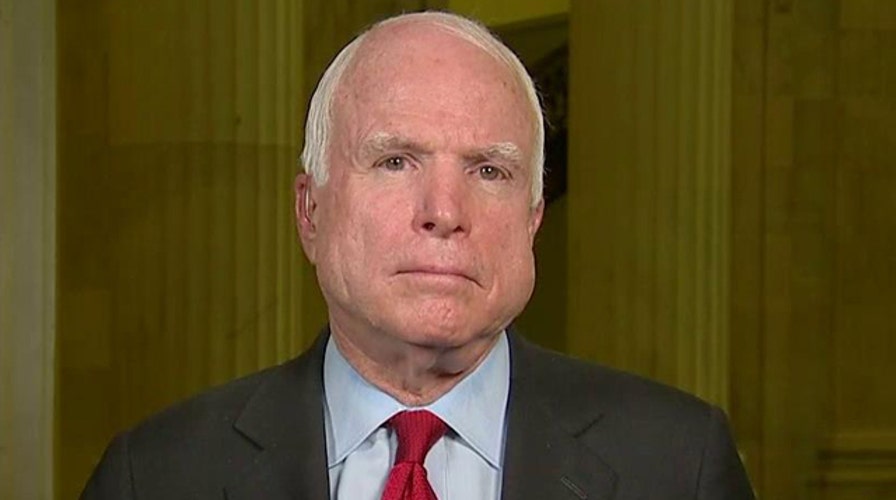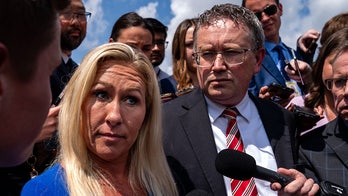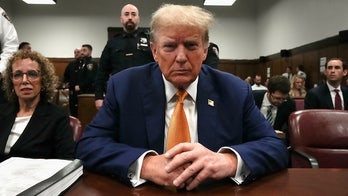Sen. John McCain reacts to President Obama's address
Lawmaker provides insight into the fight against ISIS
President Obama's announcement Wednesday that he is drastically expanding the U.S. military campaign against the Islamic State militant group was met with both tentative relief and reservations from Republican lawmakers, who expressed concern that the president's plan was not going far enough.
In addition, lawmakers from both sides of the aisle said they disapproved of the fact that Obama had not asked for a congressional vote to authorize military force against the Islamic State group, also known as ISIS or ISIL.
In a prime-time address to the nation, Obama said he has authorized U.S. airstrikes in Syria along with expanded airstrikes in Iraq, vowing to wipe out the group's terrorists "wherever they exist." He also made a renewed call to train and arm moderate Syrian rebels to aid in the fight.
Lawmakers on both sides have for weeks been clamoring for Obama to articulate a clear plan for dealing with the threat from the terrorist organization, and top Republicans such as House Speaker John Boehner said it was good the president has now done so.
However, Boehner, R-Ohio, said it was concerning that Obama seemed to view the new military action as an "isolated counterterrorism campaign," rather than an "all-out effort" to destroy the terror group.
"While the president presented a compelling case for action, many questions remain about the way in which the president intends to act," Boehner said in a statement.
Boehner also said although he supports Obama's plan to work with and train the Iraqi Security Forces and the Syrian opposition forces, he is worried such an effort would take too long to be effective.
Boehner's sentiments were echoed by Republican Sens. John McCain and Lindsey Graham, who said Obama "got some key things right" but that his plan will not be sufficient to completely destroy the terror group. They insisted additional steps are necessary.
"The president's plan will help us achieve these vital goals, but only if he remains committed to fully implementing every aspect of that plan," the lawmakers said in a joint statement. "Half measures against ISIS only make it stronger and will not lead to its destruction."
McCain told Fox News' Sean Hannity he is "very worried" about using what he called "half measures" to attempt to counter the Islamic State threat, but Obama's plan is better than the status quo.
"The status quo is unacceptable," McCain, R-Ariz., said. "All I know is, although I am very, very skeptical I'm willing to give it a try."
Rep. Buck McKeon also said he did not think Obama's plan went far enough.
"I believe that many of the elements (Obama) advocated are important and I support them," McKeon, R-Calif., said. "However, they are not enough to achieve his own stated goal of defeating ISIL."
There was also concern from lawmakers on both sides that Obama has not asked for a congressional vote to authorize military force against the militants. Obama did call in his address for Congress to authorize and fund a mission to "train and equip" the moderate Syrian rebels.
Sen Mark Udall, D-Colo., said in a statement he believes "any expanded U.S. military role beyond airstrikes in the fight against ISIL in Iraq must be approved by Congress."
Sen. Tim Kaine, D-Va., who has consistently called for congressional authorization for the strikes, agreed.
"I disagree with the president's assertion that he has all necessary legal authority to wage an offensive war against ISIL without congressional approval," he said in a statement.
Republican Sen. Bob Corker said he feels Obama is "exercising poor judgment" by not seeking Congress' authorization.
"While much of the wording in the president's speech was good, the substance of how we accomplish what he laid out is what matters," Corker, R-Tenn., said. "I believe the president is exercising poor judgment by not explicitly seeking an authorization from Congress where consensus can be reached around a substantive plan of action and support can be built for an operation that he has described will take several years."
Obama had previously struggled to articulate his policy toward the militant group, and get on the same page with his own military advisers about how urgent the threat really is outside of Iraq and Syria.
Defense Secretary Chuck Hagel last month said the terror group is "beyond anything that we've seen.
Obama, though, then confounded lawmakers when he openly admitted his administration didn't have a strategy yet for confronting the threat in Syria. He sent more mixed messages when he said the goal is to "destroy" the group but also make it a "manageable problem."
Since then, the president has projected a more consistent message that the Islamic State must be destroyed, and was consistent in that message Wednesday.





